大学英语三级常考作文类型及句型(课堂PPT)
- 格式:ppt
- 大小:36.00 KB
- 文档页数:20
![[实用参考]大学英语三级考试语法总结.ppt](https://uimg.taocdn.com/a309f9bef705cc175427091c.webp)

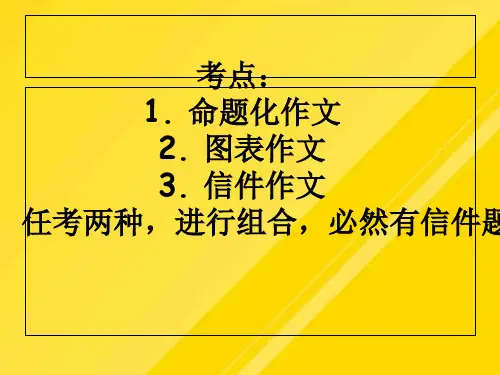
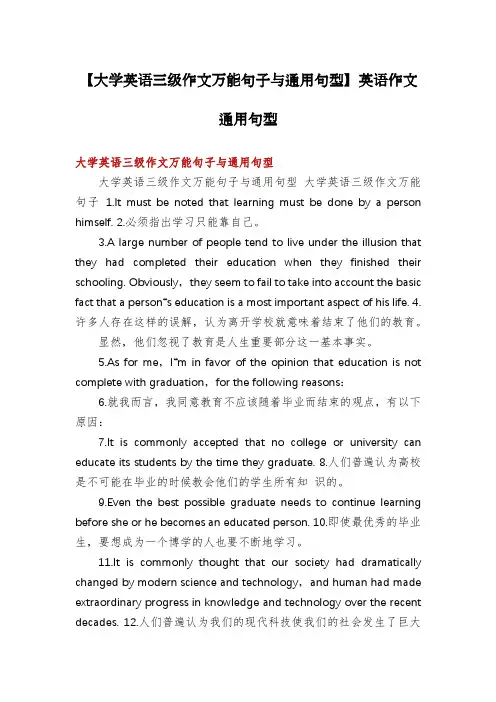
【大学英语三级作文万能句子与通用句型】英语作文通用句型大学英语三级作文万能句子与通用句型大学英语三级作文万能句子与通用句型大学英语三级作文万能句子 1.It must be noted that learning must be done by a person himself. 2.必须指出学习只能靠自己。
3.A large number of people tend to live under the illusion that they had completed their education when they finished their schooling. Obviously,they seem to fail to take into account the basic fact that a person“s education is a most important aspect of his life.4.许多人存在这样的误解,认为离开学校就意味着结束了他们的教育。
显然,他们忽视了教育是人生重要部分这一基本事实。
5.As for me,I“m in favor of the opinion that education is not complete with graduation,for the following reasons:6.就我而言,我同意教育不应该随着毕业而结束的观点,有以下原因:7.It is commonly accepted that no college or university can educate its students by the time they graduate. 8.人们普遍认为高校是不可能在毕业的时候教会他们的学生所有知识的。
9.Even the best possible graduate needs to continue learning before she or he becomes an educated person. 10.即使最优秀的毕业生,要想成为一个博学的人也要不断地学习。
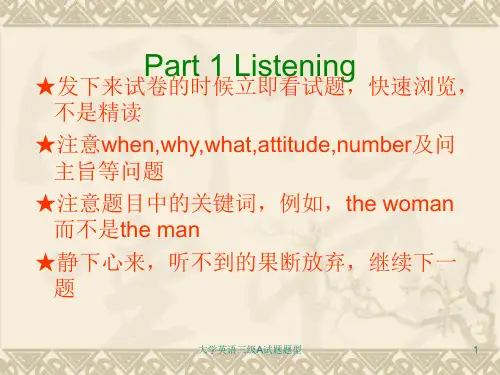
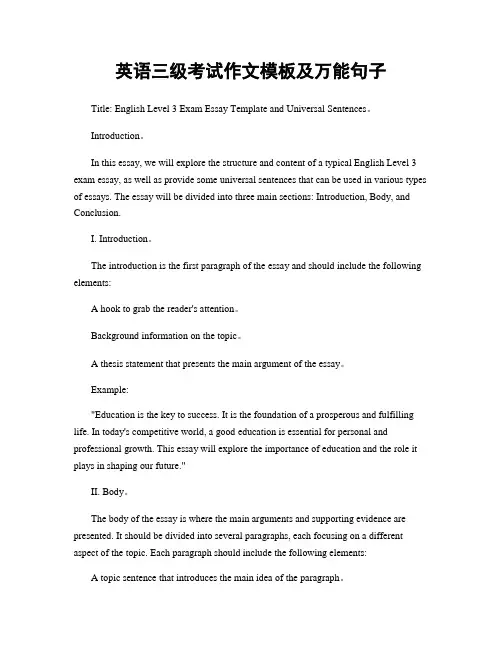
英语三级考试作文模板及万能句子Title: English Level 3 Exam Essay Template and Universal Sentences。
Introduction。
In this essay, we will explore the structure and content of a typical English Level 3 exam essay, as well as provide some universal sentences that can be used in various types of essays. The essay will be divided into three main sections: Introduction, Body, and Conclusion.I. Introduction。
The introduction is the first paragraph of the essay and should include the following elements:A hook to grab the reader's attention。
Background information on the topic。
A thesis statement that presents the main argument of the essay。
Example:"Education is the key to success. It is the foundation of a prosperous and fulfilling life. In today's competitive world, a good education is essential for personal and professional growth. This essay will explore the importance of education and the role it plays in shaping our future."II. Body。
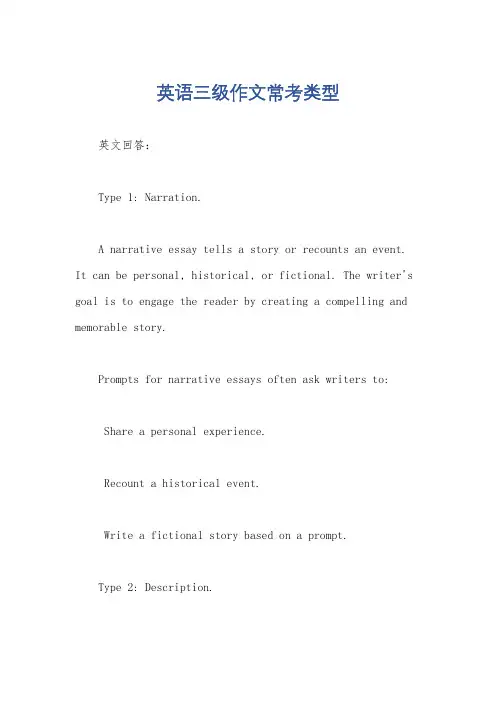
英语三级作文常考类型英文回答:Type 1: Narration.A narrative essay tells a story or recounts an event. It can be personal, historical, or fictional. The writer's goal is to engage the reader by creating a compelling and memorable story.Prompts for narrative essays often ask writers to:Share a personal experience.Recount a historical event.Write a fictional story based on a prompt.Type 2: Description.A descriptive essay paints a vivid picture of a person, place, or thing. The writer uses sensory details and figurative language to create a rich and immersive experience for the reader.Prompts for descriptive essays often ask writers to:Describe a person.Describe a place.Describe an object.Type 3: Argumentation.An argumentative essay presents a reasoned argument on a specific topic. The writer typically takes a position on the topic and provides evidence to support their claims.Prompts for argumentative essays often ask writers to:Argue for or against a particular issue.Analyze the causes and effects of a problem.Evaluate the effectiveness of a solution.Type 4: Analysis.An analytical essay examines a text, concept, or event in order to gain a deeper understanding of it. The writer provides a detailed and objective analysis, identifying key points and exploring their significance.Prompts for analytical essays often ask writers to:Analyze a literary text.Analyze a historical event.Analyze a social or political issue.Type 5: Synthesis.A synthesis essay combines ideas and information from multiple sources to create a new and original perspective. The writer draws connections between different sources and presents a cohesive and well-argued thesis.Prompts for synthesis essays often ask writers to:Combine ideas from different sources.Synthesize multiple perspectives on a topic.Develop an original argument based on existing research.中文回答:常考类型 1,记叙文。
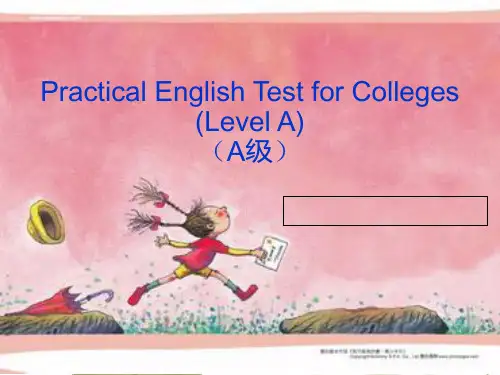
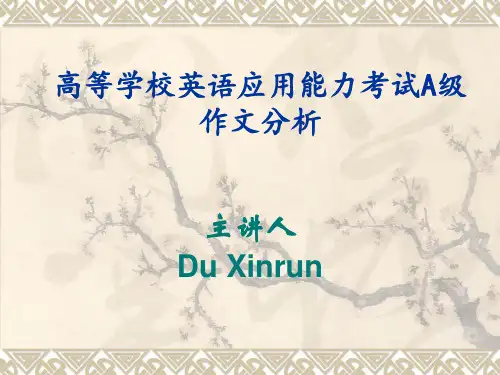
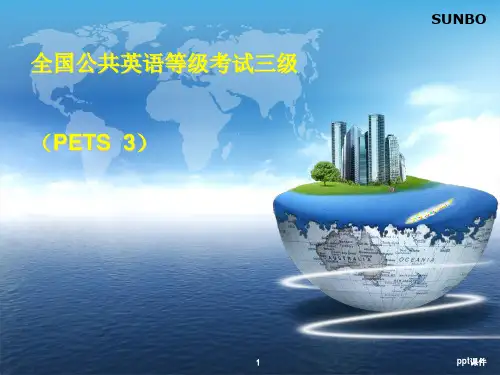
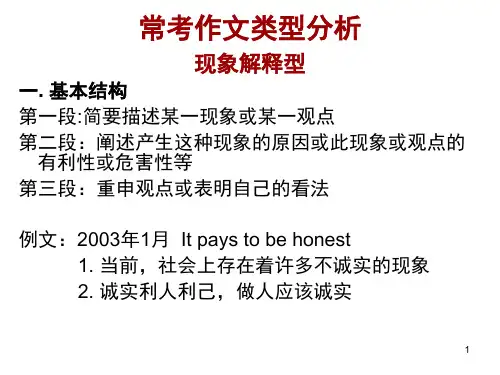
浙江省大学英语三级作文课件As a seasoned writer, I understand the significance of effective communication in English. In this essay, I will explore the challenges and opportunities associated with the use of technology in education, with a specific focus on the integration of AI in the classroom. The rapid advancement of technology has significantly transformed various aspects of our lives, and education is no exception. The integration of AI in education presents both benefits and challenges, and it is essential to critically examine its impact from multiple perspectives.First and foremost, the integration of AI in education has the potential to revolutionize the learning experience for students. AI-powered educational tools can personalize learning experiences, catering to individual learning styles and abilities. This adaptive learning approach can help students to progress at their own pace, thereby enhancing their overall academic performance. Additionally, AI can assist educators in identifying students' strengths and weaknesses, allowing for targeted interventions and support. This personalized approach to education has the potential to bridge the achievement gap and ensure that all students have access to quality education.However, it is essential to acknowledge the potential challenges associated with the integration of AI in education. One of the primary concerns is theethical use of AI in educational settings. As AI continues to evolve, there is a risk of perpetuating biases and inequalities, particularly in the assessment and evaluation of students. It is crucial to ensure that AI algorithms are designed and implemented in a way that promotes fairness and equity in education. Moreover, the reliance on AI-powered tools may lead to a reduction in human interaction within the classroom, potentially impacting the socio-emotional development of students. The balance between technological advancement and human touch in education must be carefully considered to ensure holistic development.From an educator's perspective, the integration of AI in education raises questions about the role of teachers in the classroom. While AI can automate certain administrative tasks and provide data-driven insights, the irreplaceable value of human educators in mentorship, guidance, and inspiration cannot be overlooked. Teachers play a pivotal role in cultivating critical thinking, creativity, and emotional intelligence in students – elements that cannot befully replicated by AI. Therefore, it is crucial to strike a balance between leveraging AI as a tool for enhancing learning and preserving the human connection in education.Furthermore, the integration of AI in education has broader implications for the future workforce. As AI continues to automate routine tasks, there is a growing need for students to develop skills that are uniquely human, such as complex problem-solving, creativity, and emotional intelligence. Educators must adapt their teaching methods to foster these skills, preparing students for the demands of the future workforce. Additionally, there is a need for ongoing professional development for educators to effectively leverage AI tools and technologies in the classroom.In conclusion, the integration of AI in education presents a myriad of opportunities and challenges that must be carefully navigated. While AI has the potential to personalize learning, support educators, and prepare students for the future workforce, it also raises concerns about ethical use, human interaction, and the evolving role of educators. As we embrace the benefits of AI in education, it is essential to maintain a human-centered approach, ensuring that the holistic development of students remains at the forefront. By critically examining the impact of AI in education from multiple perspectives, we can harness its potential while mitigating potential drawbacks, ultimately shaping a more inclusive and equitable education system.。